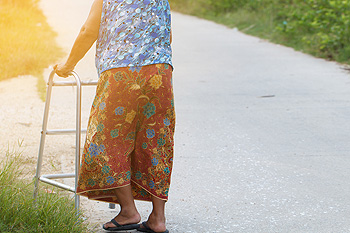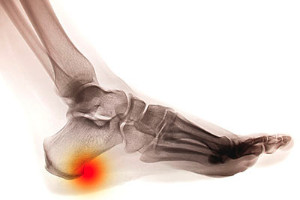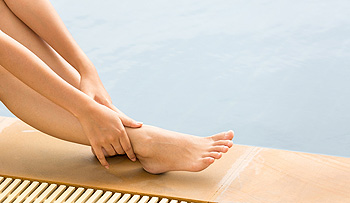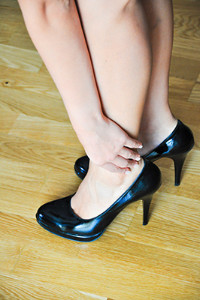April 2020
Falling and Independence
 When older people fall, they may become fearful to then complete daily activities, and can lose some of their independence. Additionally, the fear of falling may have some seniors become anxious and depressed. A helpful method that may prevent these feelings from developing may come from implementing fall prevention strategies, which may enable older people to feel more secure. These can consist of removing torn rugs from the living environment, and installing grab bars in the shower and toilet area. Additionally, it is beneficial to have regular vision and physical examinations to update current prescriptions and eyeglasses. If you would like more information about fall prevention techniques, please consult with a podiatrist who can help you avoid potential painful foot conditions.
When older people fall, they may become fearful to then complete daily activities, and can lose some of their independence. Additionally, the fear of falling may have some seniors become anxious and depressed. A helpful method that may prevent these feelings from developing may come from implementing fall prevention strategies, which may enable older people to feel more secure. These can consist of removing torn rugs from the living environment, and installing grab bars in the shower and toilet area. Additionally, it is beneficial to have regular vision and physical examinations to update current prescriptions and eyeglasses. If you would like more information about fall prevention techniques, please consult with a podiatrist who can help you avoid potential painful foot conditions.
Preventing falls among the elderly is very important. If you are older and have fallen or fear that you are prone to falling, consult with Dr. Michael A. Wood from Foot Health Institute. Our doctor will assess your condition and provide you with quality advice and care.
Every 11 seconds, an elderly American is being treated in an emergency room for a fall related injury. Falls are the leading cause of head and hip injuries for those 65 and older. Due to decreases in strength, balance, senses, and lack of awareness, elderly persons are very susceptible to falling. Thankfully, there are a number of things older persons can do to prevent falls.
How to Prevent Falls
Some effective methods that older persons can do to prevent falls include:
- Enrolling in strength and balance exercise program to increase balance and strength
- Periodically having your sight and hearing checked
- Discuss any medications you have with a doctor to see if it increases the risk of falling
- Clearing the house of falling hazards and installing devices like grab bars and railings
- Utilizing a walker or cane
- Wearing shoes that provide good support and cushioning
- Talking to family members about falling and increasing awareness
Falling can be a traumatic and embarrassing experience for elderly persons; this can make them less willing to leave the house, and less willing to talk to someone about their fears of falling. Doing such things, however, will increase the likelihood of tripping or losing one’s balance. Knowing the causes of falling and how to prevent them is the best way to mitigate the risk of serious injury.
If you have any questions, please feel free to contact one of our offices located in Lansing, and Chicago, IL . We offer the newest diagnostic and treatment technologies for all your foot care needs.
How Do Heel Spurs Develop?
 Pain in the heel area is a common type of foot pain. Many people have a condition that is referred to as heel spurs, and the patient may become aware of this condition when frequent heel pain is present. It is defined as a small bone that grows and extends from the heel bone. This ailment may be caused for a variety of reasons. These can include medical conditions such as flat feet or high arches, a tight Achilles tendon, or from wearing shoes that do not fit correctly. Patients may notice the pain is worse upon arising in the morning, and may become uncomfortable if running activities are pursued. There are several types of treatment options available, and it is suggested that you schedule a consultation with a podiatrist who can determine which one is best for you.
Pain in the heel area is a common type of foot pain. Many people have a condition that is referred to as heel spurs, and the patient may become aware of this condition when frequent heel pain is present. It is defined as a small bone that grows and extends from the heel bone. This ailment may be caused for a variety of reasons. These can include medical conditions such as flat feet or high arches, a tight Achilles tendon, or from wearing shoes that do not fit correctly. Patients may notice the pain is worse upon arising in the morning, and may become uncomfortable if running activities are pursued. There are several types of treatment options available, and it is suggested that you schedule a consultation with a podiatrist who can determine which one is best for you.
Heel spurs can be incredibly painful and sometimes may make you unable to participate in physical activities. To get medical care for your heel spurs, contact Dr. Michael A. Wood from Foot Health Institute. Our doctor will do everything possible to treat your condition.
Heels Spurs
Heel spurs are formed by calcium deposits on the back of the foot where the heel is. This can also be caused by small fragments of bone breaking off one section of the foot, attaching onto the back of the foot. Heel spurs can also be bone growth on the back of the foot and may grow in the direction of the arch of the foot.
Older individuals usually suffer from heel spurs and pain sometimes intensifies with age. One of the main condition's spurs are related to is plantar fasciitis.
Pain
The pain associated with spurs is often because of weight placed on the feet. When someone is walking, their entire weight is concentrated on the feet. Bone spurs then have the tendency to affect other bones and tissues around the foot. As the pain continues, the feet will become tender and sensitive over time.
Treatments
There are many ways to treat heel spurs. If one is suffering from heel spurs in conjunction with pain, there are several methods for healing. Medication, surgery, and herbal care are some options.
If you have any questions feel free to contact one of our offices located in Lansing, and Chicago, IL . We offer the latest in diagnostic and treatment technology to meet your needs.
Effective Methods for Daily Foot Maintenance
 Research has indicated the importance of maintaining everyday foot care. One of the first steps in accomplishing this is by wearing shoes that fit correctly. This may help to prevent uncomfortable foot conditions from developing, including bunions, hammertoes, or ingrown toenails. Additionally, it is beneficial to regularly trim the toenails, and the feet may feel better when they are washed daily. Many patients enjoy using a moisturizer on their feet, which may be helpful in preventing cracked heels. There are several ways to pamper your feet for general well-being, and it is suggested that you consult with a podiatrist who can guide you toward choosing methods that are right for you.
Research has indicated the importance of maintaining everyday foot care. One of the first steps in accomplishing this is by wearing shoes that fit correctly. This may help to prevent uncomfortable foot conditions from developing, including bunions, hammertoes, or ingrown toenails. Additionally, it is beneficial to regularly trim the toenails, and the feet may feel better when they are washed daily. Many patients enjoy using a moisturizer on their feet, which may be helpful in preventing cracked heels. There are several ways to pamper your feet for general well-being, and it is suggested that you consult with a podiatrist who can guide you toward choosing methods that are right for you.
Everyday foot care is very important to prevent infection and other foot ailments. If you need your feet checked, contact Dr. Michael A. Wood from Foot Health Institute. Our doctor can provide the care you need to keep you pain-free and on your feet.
Everyday Foot Care
Often, people take care of their bodies, face and hair more so than they do for their feet. But the feet are a very important aspect of our bodies, and one that we should pay more attention to. Without our feet, we would not be able to perform most daily tasks.
It is best to check your feet regularly to make sure there are no new bruises or cuts that you may not have noticed before. For dry feet, moisturizer can easily be a remedy and can be applied as often as necessary to the affected areas. Wearing shoes that fit well can also help you maintain good foot health, as well as making it easier to walk and do daily activities without the stress or pain of ill-fitting shoes, high heels, or even flip flops. Wearing clean socks with closed shoes is important to ensure that sweat and bacteria do not accumulate within the shoe. Clean socks help to prevent Athlete’s foot, fungi problems, bad odors, and can absorb sweat.
If you have any questions please feel free to contact one of our offices located in Lansing, and Chicago, IL . We offer the newest diagnostic and treatment technologies for all your foot and ankle needs.
Are You Suffering From Ingrown Toenails?
But I Love My High Heels!
 High heels can have the ability to make the feet and legs look slender. This is often pleasing among many people, despite the foot pain that may be felt at the end of the day. It may be beneficial to alternate your favorite high heels with shoes that have a relatively lower heel, and this may be helpful in resting the feet. Additionally, many patients perform toe stretches at the end of the day, and this can alleviate any pain that comes from wearing high heels with limited room for the toes to move freely in. Additionally, research has indicated that having regular foot massages may help to diminish existing tension in the feet. If you would like more information about how high heels can affect your feet, please consult with a podiatrist.
High heels can have the ability to make the feet and legs look slender. This is often pleasing among many people, despite the foot pain that may be felt at the end of the day. It may be beneficial to alternate your favorite high heels with shoes that have a relatively lower heel, and this may be helpful in resting the feet. Additionally, many patients perform toe stretches at the end of the day, and this can alleviate any pain that comes from wearing high heels with limited room for the toes to move freely in. Additionally, research has indicated that having regular foot massages may help to diminish existing tension in the feet. If you would like more information about how high heels can affect your feet, please consult with a podiatrist.
High heels have a history of causing foot and ankle problems. If you have any concerns about your feet or ankles, contact Dr. Michael A. Wood from Foot Health Institute. Our doctor can provide the care you need to keep you pain-free and on your feet.
Effects of High Heels on the Feet
High heels are popular shoes among women because of their many styles and societal appeal. Despite this, high heels can still cause many health problems if worn too frequently.
Which Parts of My Body Will Be Affected by High Heels?
- Ankle Joints
- Achilles Tendon – May shorten and stiffen with prolonged wear
- Balls of the Feet
- Knees – Heels cause the knees to bend constantly, creating stress on them
- Back – They decrease the spine’s ability to absorb shock, which may lead to back pain. The vertebrae of the lower back may compress.
What Kinds of Foot Problems Can Develop from Wearing High Heels?
- Corns
- Calluses
- Hammertoe
- Bunions
- Morton’s Neuroma
- Plantar Fasciitis
How Can I Still Wear High Heels and Maintain Foot Health?
If you want to wear high heeled shoes, make sure that you are not wearing them every day, as this will help prevent long term physical problems. Try wearing thicker heels as opposed to stilettos to distribute weight more evenly across the feet. Always make sure you are wearing the proper shoes for the right occasion, such as sneakers for exercising. If you walk to work, try carrying your heels with you and changing into them once you arrive at work. Adding inserts to your heels can help cushion your feet and absorb shock. Full foot inserts or metatarsal pads are available.
If you have any questions please feel free to contact one of our offices located in Lansing, and Chicago, IL . We offer the newest diagnostic and treatment technologies for all your foot and ankle needs.
Read more about Why High Heels Are Not Ideal for Healthy Feet




